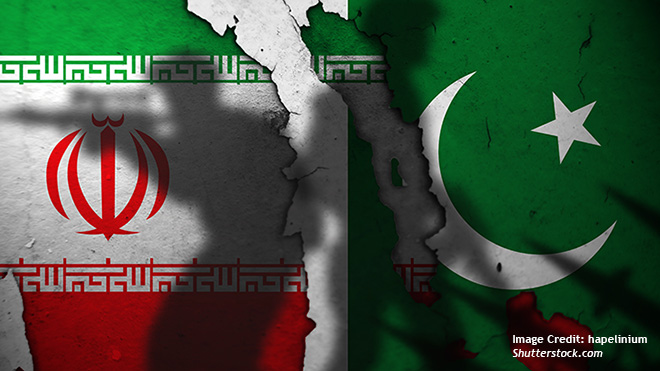Iran-Pakistan Cross-Border Strikes: Back to Brothers?

Iran and Pakistan are neighboring Islamic Republics. Both countries share a border of about 900 kilometers stretching from the Balochistan province of Pakistan to the Sistan-Balochistan province of Iran. On January 16, 2024, Iran surprisingly attacked Pakistan and launched missile and drone strikes into Panjgur town of Balochistan province. As a result of the strikes, two children were killed, and several others injured. Iranian media claimed that Iran had targeted strongholds of the anti-Iran terrorist group Jaish al-Adl (Army of Justice), which among Iranians is known as Jaish al-Zulm (Army of Injustice).
The group was allegedly involved in the murder of 11 police officers in December last year in Iran’s border city of Rask located in its Sistan-Baluchistan province. Pakistan condemned Iran´s unprovoked attacks and denounced them as a blatant violation of its airspace. However, Iran claimed that no Pakistani national was targeted as it only targeted terrorists. Iran’s strikes on Pakistan were simultaneous to its strikes in Irbil in Iraq’s Kurdistan region and Syria’s city of Idlib where it said it targeted an Israeli spy base and anti-Iran terrorist group giving rise to concerns over a wider probable conflict in the Middle East. Iran claimed that these were legitimate self-defense strikes in line with its fight against terrorism.
Quick Retaliation
Two days after Iran’s strikes into Pakistan’s territory, Pakistan hit back at Iran with drone strikes. Pakistan claimed to target the bases of separatist groups – Baloch Liberation Front (BLF) and Balochistan Liberation Army (BLA) – inside Iran. Both BLF and BLA are proscribed organizations by Pakistan. According to Pakistan’s Ministry of Foreign Affairs, during an intelligence-based operation codenamed Marg Bar Sarmachar, Pakistan undertook military strikes against hideouts of terrorists inside the Sistan-Balochistan province of Iran. Pakistan claimed that it acted in the light of credible intelligence of imminent terrorist attacks inside its territory.
Iran’s official news agency, Islamic Republic News Agency (IRNA) reported that four houses were destroyed and around nine people including women and children were killed in these attacks by Pakistan. Iran also confirmed that all those murdered in these attacks were Pakistani nationals. While condemning Pakistan’s attacks, Iran called the strikes unbalanced and unacceptable. After Pakistan’s retaliatory attacks on Iran, the fear of further military escalation between Iran and its nuclear-armed neighbor Pakistan mounted which, however, was averted within a few days’ time.
Suspension of Bilateral Ties
Pakistan and Iran have a friendly but delicate relationship. Both have accused each other in the recent past of providing safe havens to militant groups that carry out attacks in each other’s border areas. However, the situation never escalated beyond mere threats of taking revenge by Iran´s Islamic Revolutionary Guard Corps in 2019 after 27 members of its elite security force were killed in a suicide attack in Sistan-Balochistan. This time around, Iran made an unprecedented move that resulted in the suspension of ties between both countries.
Additionally, all ongoing and planned high-level visits in the following days between Pakistan and Iran were also suspended. It is pertinent to note here that the attack took place on the day when Iran’s Foreign Minister and Pakistan’s Interim Prime Minister met in Davos. At the same time, the navies of both countries held military drills together in the northern Persian Gulf and the Strait of Hormuz. Despite these high-level meetings and joint naval military drills, both countries resorted to violating the territorial sovereignty of each other.
Rapid De-escalation
Both countries attempted to alleviate the tensions despite the quick severance of diplomatic ties. While criticizing Pakistan for the attack, Iran’s Foreign Ministry attempted to allay fears of further escalation by maintaining a conciliatory tone and referring to Pakistan as a friend and brother. To avoid any kind of further escalations, IRNA also meticulously mentioned that none of the people murdered in Pakistan’s attack were Iranians.
Iran’s Foreign Minister Hossein Amir-Abdollahian, who at the time of the strikes was attending the World Economic Forum in Davos, also emphasized brotherly relations with Pakistan. He said that he had talked to Pakistan’s interim Foreign Minister Jalil Abbas Jilani and assured him that Iran respected Pakistan’s territorial integrity and sovereignty. In this context, Pakistan was also very careful in its message after its strikes, saying that it fully respected the territorial integrity and sovereignty of Iran. Pakistan further said that the people of Pakistan had great affection and respect for the people of the brotherly country Iran.
Given how both countries reacted to the attacks, it would be logical to assume that the neighboring countries did not intend to escalate the situation any further. Similarly, the situation de-escalated almost after a week of severance of bilateral ties between both countries. The Foreign Ministers of both countries mutually agreed that the respective ambassadors of their countries would return to the posts by the last week of January 2024. Along with this, Iran’s Foreign Minister will undertake a visit to Pakistan on January 29 at the invitation of Pakistan’s interim Foreign Minister. This rapid de-escalation of the situation was a result of bilateral efforts. However, other countries mainly China offered to play a constructive role in de-escalating the situation at the will of both parties, and Türkiye also offered help to ease tensions between Iran and Pakistan.
Way Forward
It is a positive sign that the situation rapidly de-escalated between the two neighboring countries. Pakistan and Iran cannot afford to have strains in their diplomatic relations. Both the countries have growing trade relations and have signed a gas pipeline agreement, which has faced delays because of external pressure on Pakistan and sanctions against Iran. However, both countries have an opportunity after this small episode of tensions to enhance their cooperation to resolve bilateral security and non-security issues.
Tehran and Islamabad need to work together against common threats instead of becoming a threat to each other. Given the changing dynamics of regional and international geopolitics, dialogue and diplomacy are the way forward for lasting peace between the two Islamic Republics.